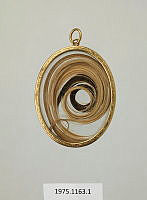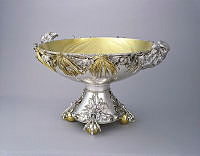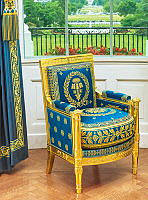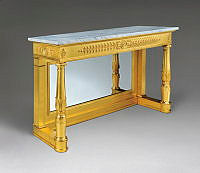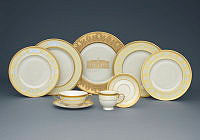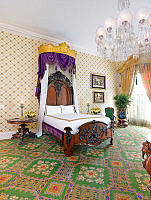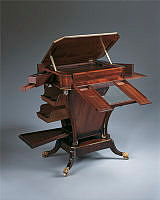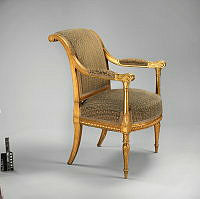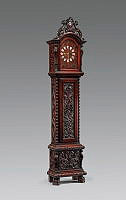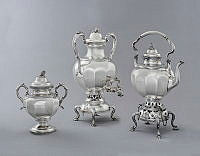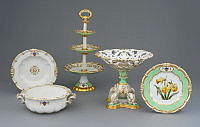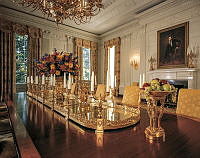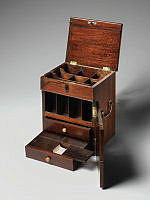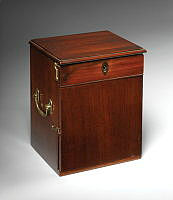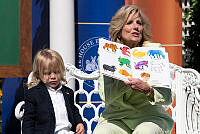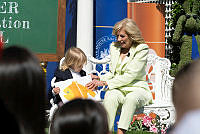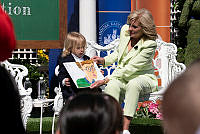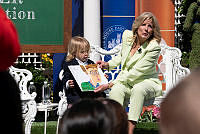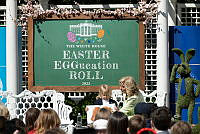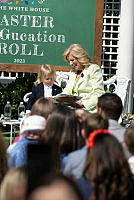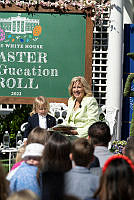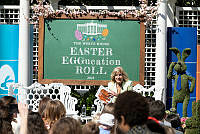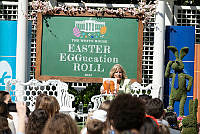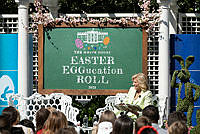Rubenstein Center Scholarship
Diversity in White House Art: Greta Kempton

From left to right, First Lady "Lady Bird" Johnson, Greta Kempton, and Margaret Truman Daniel at a White House ceremony on April 18, 1968 for the hanging of the official portrait of First Lady Bess Wallace Truman. The portrait was painted by Greta Kempton.
Harry S. Truman Presidential Library and MuseumGreta Kempton (born Martha Greta Kempton) was born in 1903 in Vienna, Austria. She discovered painting early on, completing her first painting at the age of nine—a portrait of her sleeping governess. Kempton studied at the Vienna Academy of Fine Arts and the Vienna National Academy of Design before emigrating to the United States in 1926 with her young daughter, Daisy. In 1928, Kempton registered at the Arts Student League of New York City and began studying under George E. Bridgeman. She also attended classes at the National Academy of Design in New York.1
Kempton established herself as an artist in Long Island, New York, during the 1930s. She was primarily focused on portraiture, relying on word-of-mouth to gain commissions from wealthy patrons around the city. By the mid 1930s, she had become a well-established portraitist and began spending time in California where she painted commissioned portraits for prominent individuals, including the founder of Paramount Pictures, Adolf Zukor, and the head of Metro-Goldwyn-Mayer (MGM) Studios, Louis B. Mayer.2

This 1947 photograph of the East Sitting Hall of the White House features Greta Kempton's portrait of First Daughter Margaret Truman.
Harry S. Truman Presidential Library and MuseumIn 1946, she met Treasury Secretary John Snyder as she was painting his daughter, Drucie. She went on to paint Snyder. President Harry S. Truman attended Snyder’s portrait unveiling and commissioned Kempton shortly afterwards. Kempton painted President Truman’s portrait in 1947, after five sittings with the president in the Cabinet Room of the West Wing. She also painted Truman’s daughter, Margaret.3
Several years later, she was asked to paint First Lady Bess Wallace Truman’s portrait. According to Kempton, it took the White House some time to track the artist down, after they initially could not determine her whereabouts.4 She completed Mrs. Truman’s portrait in 1952. Mrs. Truman enjoyed Kempton’s portrait so much that she took it with her when she left the White House. The original painting now hangs in the Music Room of the Truman Home at the Harry S. Truman National Historic Site located in Independence, Missouri.5

First Daughter Margaret Truman stands beneath her father's official presidential portrait by artist Greta Kempton in the White House Red Room on January 31, 1967.
Harry S. Truman Presidential Library and MuseumThe portrait of President Truman remained in the White House Collection and is now considered his official portrait. After Kempton finished this piece, she began another which was eventually completed in 1970 and added to the National Portrait Gallery’s collection of presidential portraiture. However, because Mrs. Truman brought her portrait back to Missouri, she did not have an official White House portrait. In 1967, Kempton painted a copy of the original and it was added to the White House Collection as a gift of the White House Historical Association.6 The following year, First Lady “Lady Bird” Johnson hosted a White House ceremony for the hanging of the portrait. Kempton attended the unveiling along with former First Daughter, Margaret Truman.7

This oil on canvas portrait of President Harry S. Truman was painted by Greta Kempton in 1947. Today it is Truman's official presidential portrait and hangs in the White House.
White House Collection/White House Historical AssociationKempton’s Truman portrait propelled her career forward. The likeness became the official campaign poster for the 1948 election, and it was later used on a 1983 postage stamp honoring Truman and a 1985 coin celebrating his hundredth birthday. Her painting of Truman also earned her commissions from a number of other prominent officials in his administration including Attorney General Thomas C. Clark, Postmaster General Jesse Donelson, and Secretary of the Interior Julius Krug. In 1949, she opened a one-woman exhibition at the Corcoran Gallery of Art in Washington, D.C.

This oil on canvas portrait of First Lady Bess Wallace Truman was painted by Greta Kempton in 1967. This piece is based off an earlier 1952 Kempton portrait of Mrs. Truman and hangs in the Truman Home in Independence, Missouri.
White House Collection/White House Historical AssociationIn 1963, she was named a Fellow of the Royal Society of Arts in England. Kempton continued painting throughout the rest of her life, eventually settling in New York City. Although she was asked to consider painting portraits of President Dwight D. Eisenhower and President Lyndon B. Johnson, she declined out a sense of devotion to the Truman family. In 1987, the Harry S. Truman Presidential Library and Museum hosted an exhibition of her works titled, “Greta Kempton: 40 Years on Canvas.” Greta Kempton passed away on December 10, 1991. As a testament to her close relationship with the Trumans, Kempton donated the bulk of her estate, including her private art collection, to the Truman Library in Independence.8














